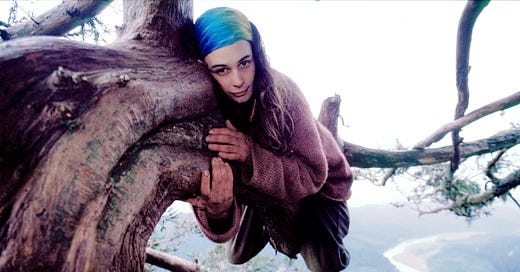My first experience with political activism was completely alienating.
I was a freshman in college, and I joined the Redwood Action Team at Stanford (acronym: RATS) for a city council meeting in Mendocino — a coastal town north of San Francisco. We were at the meeting to protest the logging of the Northern California redwoods.
At the time, an environmental activist named Julia Butterfly Hill was living in one of those redwoods. We called her on a cellphone, and she gave us a pep talk, on speaker, from her redwood tree.
It was all very exciting…but I noticed something strange.
Two things, actually: first, I noticed that the people we were protesting against looked like very humble people. They were loggers, with their families, and they looked like migrant workers. And I thought to myself: I don’t want to be on the opposite side from those people. I want to be on the same side as the trees and the people. The way these lines are drawn doesn’t make sense to me.
The second thing I noticed was how the city council members reacted to our testimony about protecting the redwoods. Their eyes were glazed over. They’d clearly heard a millions times about the endangered spotted owl and southern salamander. And I thought to myself: this is not changing their minds. I don’t know what would, but it’s not this.
That was the end of my involvement with RATS, and with politics — for a while.
My second observation about the city council members sparked a fascination with the question: how do people change? That fascination led me to launch Reckonings — a podcast that explores how people change their hearts and minds. Stories include that of a deeply conservative Congressman who had what he calls a “spiritual conversion” on climate change, a white supremacist who transcended a life of violence, and the architect of Facebook's business model who has since devoted his life to tackling technology addiction. Reckonings was featured in The Constant Listener's Best Podcasts of 2018, aired on radio stations nationwide, and had episodes adapted for major podcasts like Snap Judgment and Love+Radio.
Back to the redwoods, my first observation about how the lines of the debate were (mis-)drawn sparked a curiosity about how to integrate different perspectives. That curiosity led me to create Faces of X — this series of short videos that integrate perspectives on divisive issues.
My first activism experience was indeed alienating, but ultimately illuminating.
In the spirit of Reckonings, may we change our views to adapt to the reality around us. And in the spirit of Faces of X, may we integrate more perspectives in order to perceive reality more fully.





